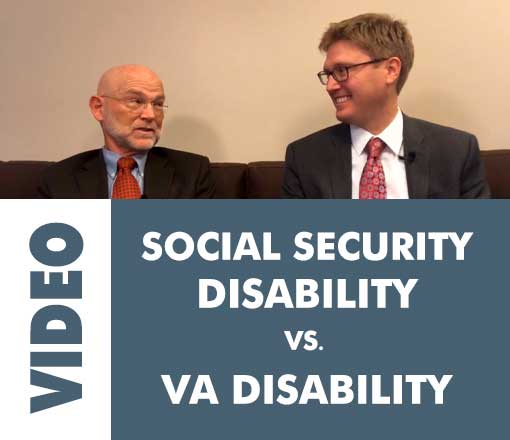Social Security Disability (SSDI) vs. VA Disability Compensation

This week, CCK partner Zachary Stolz and Social Security expert Michael Mooney discuss the role of the Social Security Administration and the Department of Veterans Affairs in administering federal disability benefits. They also answer some commonly asked questions about the interplay between Social Security Disability Insurance and VA disability compensation.

The SSA and the VA
Both the Social Security Administration (SSA) and the Veterans Benefits Administration (VBA) – which is the branch of the VA that deals with disability benefits – are systems designed to reward people for good efforts.
The Social Security system typically rewards people who have worked and paid into the system hoping to retire. For people who whose employment ends because they have become disabled, Social Security Disability Insurance (SSDI) provides disability benefits that can carry them over until they reach retirement age.
Similarly, the VA system is designed to reward people who have sacrificed for the country, who have given something of themselves physically, emotionally or both. Through VA disability compensation, veterans are paid monthly based on the VA’s assessment of the severity of their service-connected disability (or disabilities).
Disability, according to Social Security and the VA
Though Social Security and the VA have similar aims, there is a profound difference in the way that each system defines disability. With Social Security, disability is all-or-nothing. You are either 100 percent disabled or you’re not. With the VA, each component of your disability is given a rating based on the severity of the condition. So if, for example, you have a weak knee, an elbow that doesn’t work right, and a bad back and the VA finds those conditions to be service-connected, you would receive a separate disability rating for your knee, your elbow, and your back.
Difference in wait times
A VA case could take anywhere from five to ten to twenty years, whereas a Social Security case typically takes two or three years. The difference in processing times (and thus wait times) at the SSA and the VA are, in part, explained by the two systems’ different definitions of disability.
At the VA, each ailment is considered a distinct claim and each claim is rated separately. So a veteran must gather and submit evidence for each condition and then VA adjudicators must evaluate each condition under separate (and often complex) rating criteria. In addition to the medical evaluation of each ailment, VA adjudicators must determine whether or not each condition is service-connected – meaning the condition was caused or aggravated by an in-service event.
Social Security, on the other hand, is much simpler. Adjudicators just need to answer one overall question: can the person work?
Will a veteran who wins an SSDI case automatically win their VA disability case?
The short answer: No, not automatically. A veteran who wins a Social Security case may not automatically win their VA case. This is, in part, because the VA requires proof that each disability is service-connected. Especially when there are multiple disabling conditions or mental health issues at play, it can be hard to distinguish exactly which condition is causing a given impairment that prevents work.
If I’m already getting SSDI, why file for VA disability at all?
At this point, you might be thinking, “The VA has a stricter definition of disability, a more complicated claims process, longer wait times, and can’t even do basic math when calculating my award. If I’m already receiving Social Security Disability Insurance, why bother?” But there are many reasons filing for VA disability is worth the struggle.
“The VA disability system, when it works, is a beautiful thing,” says Mr. Mooney. If a veteran is rated 100 percent, they will receive about $3,000 a month. And even less-than-total disability ratings come with significant benefits.
In contrast to SSDI, VA disability has no age limit. The Social Security Administration terminates all disability benefits when the recipient reaches retirement age, 66 years old. The recipient then receives Social Security Retirement instead of SSDI. Within the VA, however, there is no age limit for disability benefits. A veteran could be 80 years old, for example, and still receive VA disability benefits. Even after retirement age, veterans can still apply for and receive disability benefits.
VA disability is tax-free and does not offset other government benefits. With some government benefits, there are “double-dipping” rules that require participants to subtract the amount of one benefit from the other government benefits they receive. With Social Security and VA disability, this is not the case. The money you receive for VA disability compensation will not be taxed and will not affect the payment amounts of other benefits.
During the VA claims process, benefits accumulate. Though the VA disability process can be frustratingly slow, if the veteran wins, they will be paid retroactive benefits. This means the benefits are awarded effective the the date the VA received a very large sum in some cases.
What about SSI and VA Pension?
In addition to VA disability compensation and SSDI, there are two other disability programs run by the VA and the SSA – VA Pension and Social Security Insurance (SSI). VA pension and SSI are designed for individuals who are disabled and have a low-income (below the federal poverty level).
VA has a nearly identical program – VA pension. Unlike VA disability compensation, the veteran’s disability does not have to be service-connected to be eligible for VA pension. All the veteran must prove is that they cannot work because of a disability, that they served during a wartime period, and that they meet the income level requirements.
Both SSI and VA pension are needs-based programs, meaning eligible applicants cannot have any other income. If they are making money from a part-time job or they are getting regular Social Security benefits, their SSI or VA pension compensation amounts will be reduced dollar for dollar.
About the Author
Share this Post
